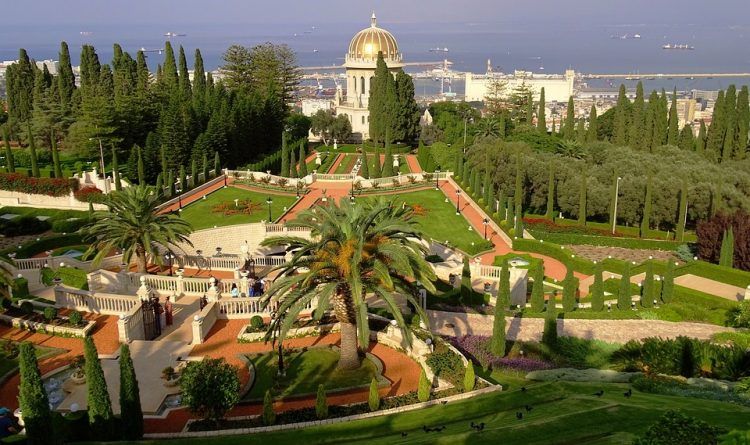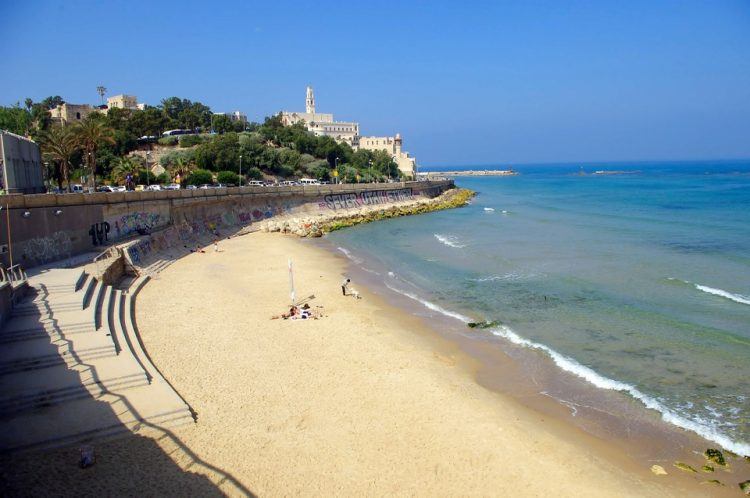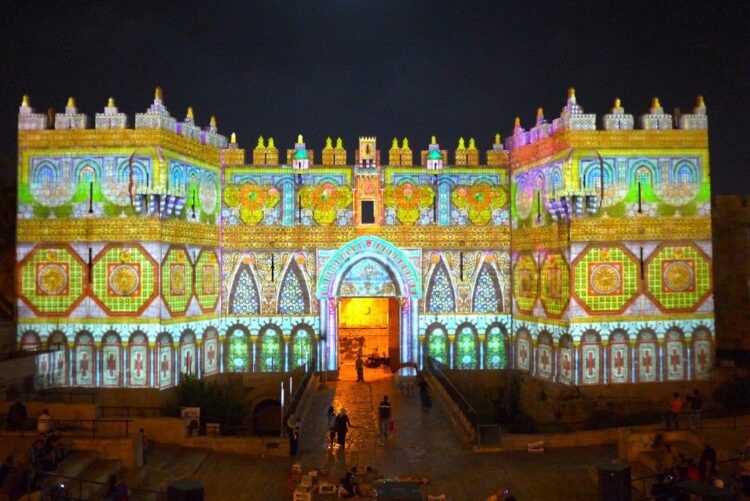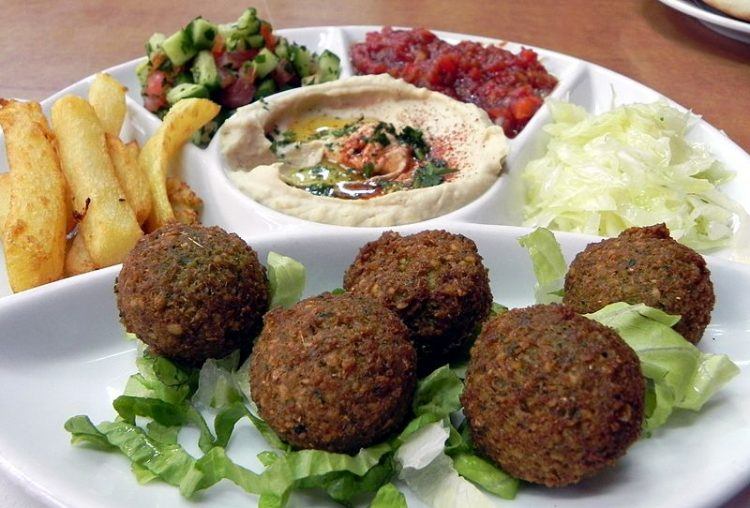Thinking of backpacking Israel? As it is one of the more expensive destinations in the Middle East, planning ahead is paramount.
Don't be put off by this, though! Today, we will guide you through the planning process, giving you top tips on when to visit, what to experience, and how to save money while backpacking the Holy Land.
Table of Contents
- Backpacking Israel Tips
- 1. Visit during one of these festivals or holidays
- 2. Join a religious service
- 3. Learn Israeli folk dancing (Rikudei Am)
- 4. Take a Krav Maga martial art class
- 5. Relax at its gorgeous (and free) gardens and parks
- 6. People watch and surf at its Mediterranean beaches
- 7. Go shopping for cheap, fashionable clothes and accessories
- 8. Wander through traditional Israeli markets
- 9. Sample global cuisine for just a few shekels
- 10. Observe the kaleidoscope of Israeli cultures
- 11. Explore its diverse geography
- 12. Go wine tasting
- 13. Dive into hip, trendy, freaky Tel Aviv
- 14. Volunteer in a kibbutz or charity
- 15. Gain a skill while mingling with locals
Backpacking Israel Tips
1. Visit during one of these festivals or holidays
When's the best time to visit Israel? It highly depends on the experiences you are seeking. A good rule of thumb, however, is to visit during one of its many festivals and holidays.
Several of the Jewish holidays fall in autumn and winter–with most being free and open to the public.
Many celebrations, however, take place during the summer months of July and August. These typically include music, food, and art festivals–plus a heftier price tag.
Below, some of our favorites by calendar month:
- January-February: Darom Adom (Scarlet South) Festival, where visitors enjoy a carpet of anemone flowers, can pick their own, and enjoy special activities.
- March-April: Passach; Doof Festival (trance music); Zorba the Buddha Festival (spiritual music)
- May: Taste of the City Food Festival
- June: Jerusalem Light Festival; Midburn Festival (similar to Burning Man); Groovestock
- July-August: Karmiel Dance Festival in Safed; Beer Festival in Tel Aviv
- September: Sukkot; Reggae in the Desert; House/Techno Music UNITY Rising Spirit Festival
- October: InDNegev Indie Music Festival; Neverland International Electronic Music Festival; Festival BeShekel (free!)
- December: Hanukkah; Hiking in Boots Festival in the Carmel
2. Join a religious service
Even if you are not religiously inclined, joining a public religious service is a good way of meeting locals and delving deeper into Israeli culture.
There are several Friday evening Jewish services open to the public, for instance. You may just find yourself being invited to Friday night dinner.
Some of our favorites include:
- Sunset service at the Tel Aviv Port
- Progressive Judaism’s Friday evening service at Jaffa Port’s Daniel Center
- Pluralist service at the First Station in Jerusalem
- An Orthodox service at the Western Wall in Jerusalem
3. Learn Israeli folk dancing (Rikudei Am)
Israelis love folk dancing. They dance to traditional Israeli music–and the regulars really take it seriously. It can be done either as couples or in a group, similar to line dancing in the U.S.
Groups gather across the country almost every night of the week to folk dance, forming a circle. At these get-togethers, you’ll find that people of all ages are welcome to join in and learn the steps.
Some of these folk dance sessions are held at wonderful locations such as the Kiryat Haim beach, Rishon Lezion, Bat-Yam, Ashdod, Nahariya, and Gordon Beach in Tel Aviv (11 a.m. on Saturdays for that one). Other folk dance sessions are held in parks, universities and in community centers.
Check out the website Harokdim for dates, times, and locations. Many are free and, if not, the entrance fee is just a few shekels.
4. Take a Krav Maga martial art class
You have probably heard about the tough Israelis and their personal defense skills. The martial art form Krav Maga (contact fighting), in particular, was developed in Israel and is a serious form of combat training which uses techniques borrowed from judo, wrestling, and boxing.
Lessons are available across the country for all ages and abilities–including women-only classes. While some Krav Maga sessions are free, most will cost you a fee. For more information, contact the Israeli Krav Maga Association.

The Baha'i Gardens in Haifa
5. Relax at its gorgeous (and free) gardens and parks
Israel may seem like it is built on a desert, but don’t underestimate its beautiful parks and gardens. Many of them offer wide green spaces to relax on, free activities, and plenty to see.
The most conveniently located, and one of the best parks in the country, is HaYarkon Park in Tel Aviv. Like an octopus' tentacles, HaYakon sprawls through several neighborhoods, offering several services and activities to visitors.
You'll find bikes to rent, row boats, themed gardens, a climbing wall, a hot air balloon ride, a water park, Monkey Park, Bird Park, mini golf, outdoor gym stations, playgrounds, cafes, and much more.
Warning: don't swim in the Yarkon River, which cuts through the grounds.
6. People watch and surf at its Mediterranean beaches
Perhaps it goes without saying that Israel’s beaches are a major (free) attraction. Whether you come in the summer or winter, the weather will probably be good enough for a beach day.
Better yet? No matter where you are based, you will probably find a great beach nearby.
Israeli beaches are generally clean–and interesting. For instance, some beaches are reserved for the orthodox Jewish community, with separate bathing hours for men and women (Hof HaNifrad Beach, Tel Aviv). In contrast, other beaches are favored by the gay community, such as the Hilton Beach/Atzmaut Beach in Tel Aviv.
Some fun, ongoing events take place on Israeli beaches as well.
One of our favorites? Drummers sunset jam Friday nights at Drummers’ Beach (Hof HaTofim). You can also try surfing at TopSea on Tel Aviv’s Gordon Beach. There, you will find companies offering lessons and board rentals.
7. Go shopping for cheap, fashionable clothes and accessories
It may just be the exchange rate, but you can find very reasonably priced clothing in Israel. While many malls cater to high-end customers with an array of both international and local brands, there are plenty of other places to scour for unique budget finds.
Several small, privately owned fashion stores are typically tucked away on nondescript streets at each Israeli city. We recommend checking out those along Allenby Street in Tel Aviv for unusual, yet cheap clothing.
The best destination for bargain hunters backpacking Israel, though? The traditional markets.
Speaking of which, perhaps the cheapest clothing you’ll find in the country can be found in the Jaffa Market. Piles of second-hand jeans and other accessories in great condition will make you go on a shopping frenzy.
For more unique, trendy, and artistic items, try Shenkin Street (one of the coolest streets in Tel Aviv) and the side streets leading off to it.
8. Wander through traditional Israeli markets
Speaking of shopping, Israel has some fantastic markets where you can find an incredible array of goods–way beyond unique fashions.
Some must-sees include the famous Carmel Market and the adjacent, more gentrified arts and crafts market on Nahlat Benyamin, Tel Aviv. In Jaffa, the Shuk HaPishPashim (flea market) stands out due to its unique character. There, you'll see everything from furniture and antiques to second-hand clothes and household items.
In Jerusalem, the beautiful Machna Yehuda is a food lover's paradise, selling all kinds of ingredients and lined with several good-quality restaurants. Within the walled Old City, you can feel like a medieval trader haggling over souvenirs in the Arab Quarter market.
Speaking of which, go further a field to stumble upon the historical Thursday Market in Be’er Sheva. Also known as the Bedouin Market or Camel Market, you'll see wandering Bedouins in traditional garb. While camels are no longer sold here, it's easy to imagine how this market used to be.
Other cities with worthy traditional markets include Natanyia, Rosh Eyen, Eilat, Acre, and Ramle.
9. Sample global cuisine for just a few shekels
Israel’s Jewish population immigrated here from across the globe; each community bringing with it unique customs and traditions. The best way to experience them? By sampling their most popular dishes!
You might have already heard of most traditional foods, such as falafel, hummus, and shawarma. What about the sabich Iraqi sandwich though? It's a unique pita pocket is stuffed with fried eggplant, a hardboiled egg, boiled potato, tachina (an insect!), and amba. We dare you to try it!
Other communities brought delicious variations of Jewish breads and couscous. The Jewish Moroccans, for instance, brought with them too many delicious dishes to name, but their most famous is couscous served with a slow-cooked stew known as tagine.
The Jewish Yemenite community, from the Arabian Peninsula, introduced malawach. The round, flaky pastry is typically fried and eaten wrap-style, stuffed with grated tomato, white cheese, and hot sauce. Nowadays though, many joints stuff it with a selection of meats or poultry (lamb, beef or chicken) as well. Its sweet version, known as fatut, is cut up and topped with cinnamon, raisins, and honey instead.
The Ethiopian community brought berekete, a large loaf of bread which is baked all night on Shabbat. There are Ethiopian eateries all over the country, but we recommend Habash Restaurant in Tel Aviv.
In Jerusalem, you must pay a visit to the Machane Yehuda market and have a bite of Georgian Khachapuri–a leavened, cheese-filled bread.
10. Observe the kaleidoscope of Israeli cultures
Many foreigners mistakenly assume Israel is just the home of three major religions: Judaism, Christianity, and Islam. However, there are other smaller, ethnic communities and religions that also call Israel a Holy Land.
Some of these fascinating minorities include the Druze and the Baha’i. To get a glimpse of the Druze, head over to towns near Haifa, such as Daliyat el-Carmel or Isifya. In that area, you'll also be able to get a closer look at Baha’i communities, especially in Haifa proper and Acre.
While up north, don't miss this chance to visit the impressive Baha’i Gardens. Not only is it a UNESCO World Heritage Site, but its Shrine of the Báb and 19 sloping terraces form one of the holiest sites of the Baha'i faith. Admission and tours are free and open to the public.
11. Explore its diverse geography
Israel is an elongated country, which means its geography and climates can be quite diverse from region to region.
Head to the northern areas of the Golan Heights and Galilee for the European-style countryside and lush forests. Then travel south into the Negev Desert to experience barren wilderness.
Sfat and Jerusalem, however, will give you a taste of life in the hills and mountains; while Eilat, the Gateway to the Red Sea, will warm you up with its Caribbean-style resort atmosphere.
12. Go wine tasting
Did you know Israel has more than 80 wineries? In fact, its vast wine-making tradition dates back thousands of years!
Many of these Israeli wineries offer wine tastings and tours of the vineyards–some of them are even free. Our favorites include:
- Luria Winery in Moshav Safsufa (starting at 30 NIS)
- Dalton Winery tours (starting at 15 NIS)
- Flam Winery tour and tasting at Yaar Hakdoshim, Eshtaol (90 NIS)
- Kadesh Barnea Winery tour and wine tasting on Moshav Kadesh Barnea, Negev (FREE!)
- Bravdo Winery Visitor Center offers tastings and visits on Fridays (50 NIS)
Wondering where to stay in wine country for a few days? Zichron Yaakov is a picturesque village in the heart of it, home to several wineries. Don't miss the Tishbi Winery and the Carmel Winery.
In the Golan Heights wine country are several boutique wineries. The giant in this region is Golan Height Winery though, with its dedicated Visitor Center and a number of tour and tasting options.

Beach in Jaffa, Tel Aviv
13. Dive into hip, trendy, freaky Tel Aviv
Tel Aviv has a sub-culture of weird and wonderful clubs, galleries, and special events. Among our favorites is the Tel Aviv Rollers, where every Tuesday night in-line skaters take over the streets and zip down a 12.4-mile route through the city. The rollers even get a police escort as they set off from Habima National Theatre at 10 PM!
Kuli Alma is another unique spot–an underground bar on the corner of Allenby and Yehuda Halevi Streets. Buxa Bar, on the other hand, is a dance bar with underground live music.
Looking to party all night? Some Tel Aviv bars and nightclubs that stay open until dawn include the Penguin Club, Breakfast+Milk Club, The Cat and The Dog, Radio E.P.G.B., and The Block.
If you’re in Tel Aviv in March, you should also check out the Zombie Walk. Locals dress up as the living dead and hit the streets of Tel Aviv, starting from the corner of Ben Zion Blvd and King George at 9 PM.
For other weird, unique events and happenings in Tel Aviv, check out the Secret Tel Aviv website.
Need some professional help optimizing your trip? Check out Tel Aviv tour packages by Yourway, a combination of day tours to major destinations in Israel with focus on this non-stop city.
14. Volunteer in a kibbutz or charity
One of the biggest trends in tourism these days is volunteer travel where you go abroad to volunteer. Well in Israel you could volunteer for any length of time from one hour to a year.
Wish to give back during your travels? A classic volunteer experience in Israel to work on a kibbutz. Not only do you get accommodation, food, and pocket money, what you get to experience one of the most unique immersions into Israeli society. For kibbutz volunteer opportunities, check out kibbutzprogramcenter.org.
Don’t have three months or more to spare? You could still volunteer with one of the many charities in Israel. Leket Israel, which distributes food to the needy, take on volunteers to harvest fruits and vegetables from farms, pack the food, and distribute it.
Other organizations which would be happy to take a lending hand are Yad Eliezer, Yad Sarah, and Magen David Adom.
Looking for a more adventurous opportunity? You could even volunteer for the IDF (Israeli Defense Force) and work on a real army base, side by side with Israeli soldiers. For more information, check out sar-El.org.
15. Gain a skill while mingling with locals
Why not take a class in some form of sport, arts or crafts? This is another great way to meet Israelis and have fun while gaining a new skill!
We recommend joining any of the following classes or studios:
- Tel Aviv Art Studio on Ibn Gvirol
- Ceramics class at the Benyamini Contemporary Ceramics Center
- Paper mache making at the Anat Orpaz Paper Mache Studio
- Join a workshop at the Tel Aviv Makers
- Clay work at the Studio MIRA in Jaffa
- Introductory classes in a variety of fields at the Israel Museum in Jerusalem
- A course about traditional Druze cooking at Daliyat el-Carmel
- Take Israeli cooking classes at Eat & Meet in Jerusalem
- Learn more about the world of the blind and deaf at Nalagaat Center in Jaffa
- Mosaics and other fine arts at the Open Studio in Jerusalem
______
This story was provided by and brought to you in partnership with Yourway Tourism.
This post was written by a guest contributor. Please reference the author's byline in the post above for more information. If you would like to guest post on Go Backpacking, please read our submission guidelines. For information on advertising opportunities, go here.
Planning a trip? Go Backpacking recommends:
- G Adventures for small group tours.
- Hostelworld for booking hostels.



Rohit
Sunday 9th of October 2016
Thank you for this nice and wonderful information! It is very inspiring. I’m really admired your thoughts.